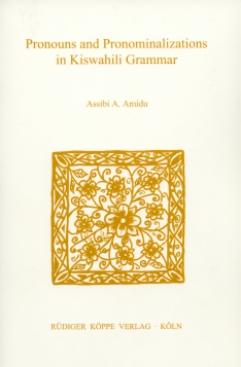
Pronouns and Pronominalizations in Kiswahili Grammar
Author: Assibi Apatewon Amidu. Series edited by: Wilhelm J.G. Möhlig †, Bernd Heine.
Series: GA Grammatical Analyses of African Languages Volume 27
200618 pp. Roman, 402 pp.
6 tables
Text language(s): English
Format: 160 x 240 mm
850 g
Paperback
€ 69.80
Buy 'Pronouns and Pronominalizations in Kiswahili Grammar' as a downloadable PDF document directly from our online shop »
Order 'Pronouns and Pronominalizations in Kiswahili Grammar' as print edition »
There has been a tendency in Kiswahili, Bantu and general linguistic studies to use the term pronoun in the same sense it is used in Indo-European studies. In doing so, the peculiarities of Kiswahili pronouns have often been overlooked in favor of Indo-European grammatical descriptions about pronouns.
In recent years, the status of pronouns in Bantu has received some new attention because of the revival of the term incorporated pronoun in modern linguistic studies spearheaded by the Lexical Functional Grammar (LFG) framework. Unfortunately, the recent usage of the term incorporated pronoun repeats all the shortcomings found in the works of the pioneers of Bantu grammatical descriptions. Probably in an attempt to make Bantu languages fit the gender system of Indo-European grammars, the systematic dichotomy pronoun vs. non-pronoun has been blurred and confused by Bantuists. As a result many claims about pronominality in Bantu descriptions cannot be verified by reference to the language and, consequently, they lack explanatory relevance for Bantu.
The present study challenges the claims of traditional Bantu and corporate linguistic descriptions on the subject of pronoun and pronominality in Bantu languages, specifically Kiswahili Bantu. It stresses that Kiswahili distinguishes between pronoun and pro-noun and their concords and provides historical evidence to illustrate how traditional descriptions arrive at their conclusions about pronouns and pronoun concords in a Bantu language like Kiswahili.
The present work is a road-map for determining in what ways the Kiswahili elements identified as pronouns, pronominal elements and pronominal concords are similar to or different from phenomena in other languages of the world.
Under these links you will find publications by the author and further studies of Swahili grammar:
Accompanying material:
- Argument and Predicate Relations in Kiswahili
(ISBN 978-3-89645-042-5 ) - Classes in Kiswahili
(ISBN 978-3-89645-022-7 ) - Locative and Non-locative in Kiswahili Bantu
(ISBN 978-3-89645-713-4 ) - Matrix Nominal Phrases in Kiswahili Bantu
(ISBN 978-3-89645-550-5 ) - Objects and Complements in Kiswahili Clauses
(ISBN 978-3-89645-560-4 ) - Reflexive and Reciprocal Syntax Revisited
(ISBN 978-3-89645-707-3 ) - Reflexives and Reflexivization in Kiswahili Grammar
(ISBN 978-3-89645-028-9 ) - Semantic Assignment Rules in Bantu Classes
(ISBN 978-3-89645-703-5 ) - The Bantu Bibliography
(ISBN 978-3-89645-181-1 ) - Transitivity in Swahili
(ISBN 978-3-927620-37-7 ) - Transitivität und Verbvalenz im Swahili
(ISBN 978-3-89645-712-7 )
Cross-reference:
- A Sketch of Swahili Morphology
(ISBN 978-3-927620-16-2 ) - Bantu Languages
(ISBN 978-3-89645-705-9 ) - Domains and Regions in Bantu Tense and Aspect
(ISBN 978-3-89645-772-1 ) - Gesprächsstrategien im Swahili
(ISBN 978-3-927620-41-4 ) - Issues in Bantu Tonology
(ISBN 978-3-89645-033-3 ) - Les extensions verbales en swahili standard
(ISBN 978-3-89645-709-7 ) - Swahili Grundkurs mit Swahili Übungsbuch und Audiomaterial
(ISBN 978-3-89645-575-8 ) - Swahili Phonology Reconsidered in a Diachronical Perspective
(ISBN 978-3-927620-38-4 ) - Swahili-Handbuch
(ISBN 978-3-927620-06-3 ) - Transitivity in African Languages
(ISBN 978-3-89645-726-4 )
| « back | Print version | [top] |
 Books
Books Audio
Audio Biographies
Biographies Series
Series Festschrifts
Festschrifts Journals
Journals